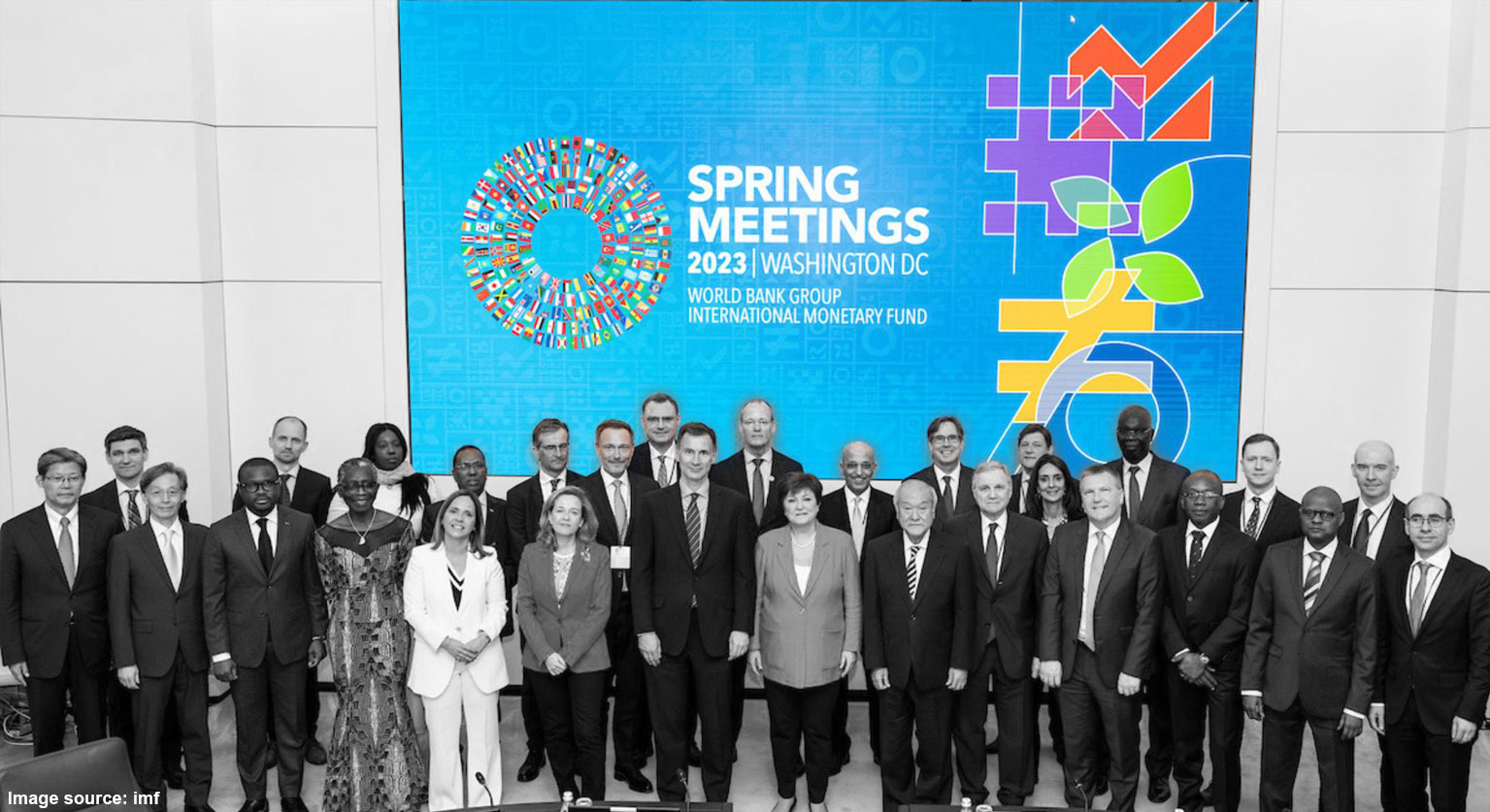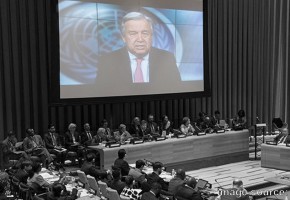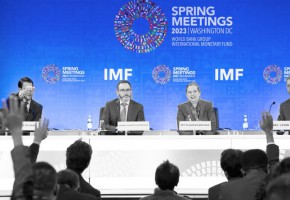

The IMF/WBG Spring Meetings amid a changing global order – Washington D.C.– Olga Jbeili
The context leading to the establishment of the Bretton Woods Institutions
In the aftermath of the Second World War the world, societies, and economies are in ruins. In addition to the toll on human lives and suffering, to date, the Second World War has been the most expensive war in history that resulted in high levels of inflation, debt, trade, and balance of payment deficits and depleted gold and U.S. dollar supplies.
As a result, the Bretton Woods Institutions (BWI), namely the International Monetary Fund (IMF) and the World Bank Group (WBG), were set up in 1944 with the objective to help rebuild shattered postwar economies and to promote international economic cooperation based on notions of consensual decision making and cooperation in trade and economic relations in order to prevent future competitive devaluations.
The political basis of the Bretton Woods system was in the confluence of two key conditions: the shared experiences of the two World Wars, driven by the idea that failure to deal with economic problems after the first war led to the second; and the concentration of power including veto and voting powers in a small number of states.
Furthermore, the Bretton Woods system required countries to guarantee convertibility to U.S. dollars, however, this parity was terminated in 1971 when many fixed currencies followed a floating regime.
The BWIs have different yet complementary roles. The IMF aims to harmonize its member countries’ monetary policies by monitoring exchange rates and maintaining exchange stability. This is done by lending reserve currencies to nations with a balance of payments deficits in order to ensure a stable climate for international trade. The WB on the other hand aims to improve the technical and financial capacities of war-torn and impoverished countries by lending money for trade purposes while promoting long-term economic development and poverty reduction. This is achieved by helping countries implement reforms or projects, such as building schools, providing water and electricity, fighting disease, and protecting the environment.
Within that context, in 1948, President Truman signed the Marshall Plan through which the United States provided conditional economic aid assistance amounting to 13.6 billion USD which helped Europe recover and restore the economic infrastructure of postwar Europe. As the recipients of the plan (16 European countries excluding the Soviet bloc) were emerging from a centrally planned war economy and faced monetary instability and budget and account deficits, it is important to note that the Marshall Plan was largely implemented through grants (90%) rather than loans (10%).
In 1976 the end of the Bretton Woods was formally ratified by the Jamaica Accords, nevertheless, its two main institutions the IMF and the WBG remain and continue to closely work together.
Today, the areas over which the IMF and the World Bank collaborate include assessing financial stability, reducing debt burdens, climate change, and the 2030 Development Agenda including the Sustainable Development Goals (SDGs).
The IMF/WBG Spring Meetings (Washington D.C., April 2023): a focus on debt and governance
In April 2023 ANND was part of the IMF and WBG Spring Meetings that took place in Washington D.C. The Annual and Spring Meetings of the IMF and WBG aim to discuss the state of the global economy and issues of international concern, such as the growth outlook, financial stability, and poverty reduction. These meetings bring together Central Bankers, Ministers, private sector executives, civil society representatives, and academics and are a unique platform to discuss economic policymaking.
The Spring Meetings took place amid a global socio, economic and political context that is fast changing and that is shaping a new world order significantly different from the one that led to the establishment of these institutions following the Second World War.
The post Covid-19 era, the start of the Russian-Ukrainian war, the devastating natural disasters in Turkey and Syria, and climate shocks in Malawi, Mozambique, and Madagascar; in addition to the most recent outburst of armed conflicts such as in Sudan, rendered the global outlook increasingly uncertain. Specifically, the Global South is in dire need of access to sustainable development finance to alleviate unprecedented inflationary pressures mainly linked to food and energy, to tackle increasing inequalities, and to contain unsustainable debt levels that are crowding out development priorities and killing the Sustainable Development Goals (SDGs).
This article will shed light on two critical issues faced by the Global South and addressed during the Spring Meetings, including debt and financing for development, and the impacts of the International Financial Architecture including quotas and voting power on policymaking. The article will conclude by highlighting the need to rethink the International Financial Architecture while designing policies that take into account not only the new global order but also the financing gaps, needs, and priorities of recipient countries in a pragmatic, fair, and democratic manner.
The IMF, through the words of its Chair Kristalina Georgieva’s Opening Statement, reiterated the importance of maintaining the building pillars of the BWIs including “international cooperation and strengthening multilateralism that are essential to bolster global growth, protect the stability of the International Monetary System, address persisting health risks, and accelerate mutually reinforcing efforts toward a green, digital and inclusive future”.
First, the IMF reiterated its role in providing financial support to help member countries address the balance of payments needs and welcomed strong policy and financial support to low-income countries. In that regard, ahead of the Annual Meetings in October 2023 in Marrakesh, the IMF stated that resources for the Poverty Reduction and Growth Trust need to be mobilized from a broad range of members – including through voluntary Special Drawing Rights (SDRs) channeling or equivalent contributions.
The IMF recognized its efforts to address ongoing debt challenges and accelerate the implementation of the G20 Common Framework for debt treatments on a case-by-case basis in a predictable, timely, orderly, and coordinated manner. This aims to be achieved through improving information-sharing processes with creditors including information underlying the Debt Sustainability Analysis, which is subject to confidentiality. The IMF recognized that debt restructuring is specifically important in light of rising vulnerabilities in middle-income countries therefore there is a need to promote stronger creditor coordination for debt restructuring and to launch the Global Sovereign Debt Roundtable.
In light of the above high-level statements, the IMF’s latest World Economic Outlook for 2023 states that raising government revenues and reducing expenditures brings down the debt-to-GDP ratios, and that average fiscal consolidation has a negligible effect on debt ratios, partly because fiscal consolidation tends to slow GDP growth which has a negative effect on the debt to GDP ratio. In the IMF views, for these measures to be effective they require domestic and global economic conditions – such as growth in the domestic or global economy, and low global risk aversion and financial volatility – that are not always present.
However, it is important to recall that the IMF is the lender of last resort, and it comes with standard packages of policy prescriptions advocating for pro-cyclical monetary and fiscal austerity policies. Historically the IMF required countries to implement “structural adjustment programs” by reducing expenditures, increasing taxes, liberalizing trade, and deregulating and privatizing State Owned Entities (SOEs). Over the years, these policies have gradually moved from structural reforms to fiscal consolidation – a policy aimed at reducing government deficits and debt accumulation – with a focus on “private-led-growth”. Therefore, the above statements do not clearly capture the need to design progressive policies that take into account the mere global growth outlook – expected to fall from 3.4% in 2022 to 2.8% in 2023 – to meet the criteria advanced by the IMF for its policies to be effective. Instead, the IMF in the latest Outlook resorts to older models of structural adjustment programmes that are contrary to conventional wisdom. Indeed, in recent years, IMF programs tended to require indebted countries to shift to market-determined exchange rates making local currencies dramatically lose value, raise interest rates and cut subsidies, which could undermine debt reduction in contrast to policies that restore much-needed economic activity.
In parallel, the evolution of the IMF Social Policy Advice highlights the incorporation of social policy into IMF-supported programs mainly through the promotion of targeted cash assistance to replace subsidies. However, not only evidence suggests that cash assistance programs have limited impacts as they rely on Proxy Means Testing and have a high rate of exclusion, but also IMF agreements hardly safeguard effective social policies as they do not incorporate any social safety net measures among rising rates of vulnerability, inequality, and poverty leading to social unrests and delayed recovery in the Global South.
Amidst rising vulnerabilities and the worst debt crisis in many decades – even the U.S. Treasury Secretary Janet Yellen warned in May 2023 of a potential default on debt as early as June – the BWIs together with the G20, only managed to reiterate the need to rely on the Common Framework noting that it is failing in delivering timely and fair debt resolution to date. Indeed, enhancing the Common Framework is necessary but not sufficient, partly because it is not inclusive as discussions take place mainly among creditors exclusively. Additionally, the IMF quota-based surcharges – a system of fees on loans that are meant to encourage early repayment of IMF loans – place an additional unfair burden on vulnerable countries in dire need of financial support.
Secondly, as the BWIs were built on the ruins of the old world order, these institutions have been subject to criticism regarding asymmetries of power and uneven-handed treatment of countries in similar circumstances as argued by Leech et al. (2003). For example, the process to select the heads of the IMF and WBG is still based on the 75-year-old gentleman’s agreement in which the U.S. selects the President of the WB and Europe selects the IMF’s Managing Director, which defeats the original purpose to uphold multilateralism in the economic and financial spheres.
Furthermore, the BWIs have a system of governance based on weighted voting where each member has a number of votes depending on its quota allocation and which must be cast as a bloc. This setup leads to a problem of democratic legitimacy since a “member’s influence or voting power within such decision-making systems does not, in general, corresponds to its voting weight. Most recently, this imbalance has been observed in the latest SDRs allocation in 2021 where the IMF issued and distributed 650 billion USD worth of SDRs during the Covid-19 pandemic. Recently, 280 CSOs and academics called for the fair channeling of SDRs to countries in greater need, although it is recognized that SDRs alone are not intended to cover a country’s financing needs.
To conclude, in light of a polarized world and unprecedented vulnerabilities and rising inequalities, there has been a great consensus to reform the International Financial Architecture which remains a key priority for addressing development challenges and global inflationary pressures, particularly in the Global South which is highly commodity-dependent.
Reforming the International Financial Architecture to timely cope with a fast-changing global order requires more than access to development finance that cannot be entirely channeled through existing systems. That is why there is a need to work on different fronts in parallel, including the institutional, operating and financial models within BWIs as already recognized in the WBG’s report to governors, to develop closer coordination among multilateral institutions, but also to address systemic issues pertinent to the Global South. The old world no longer exists.
Olga Jbeili
Recent publications

ANND Newsletter January 2026 - From Davos to the UPR: Between Promises, and Accountability
Related publications


